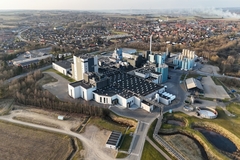
- Industry news
Industry news
- Category news
Category news
- Reports
- Key trends
- Multimedia
Multimedia
- Journal
- Events
- Suppliers
- Home
- Industry news
Industry news
- Category news
Category news
- Reports
- Key trends
- Multimedia
Multimedia
- Events
- Suppliers
Finnish start-up targets cost and emission reductions in plant-based protein ingredient production

Food tech start-up Happy Plant Protein has raised €1.8 million (US$1.9 million) to commercialize its manufacturing process, which helps produce plant ingredients from legumes, such as peas, lentils and cereals, with a 70-80% protein content.
Jari Karlsson, CEO and co-founder of the company, sits down with Food Ingredients First to discuss the patented technology and its potential to leverage underutilized crops to meet global demand for sustainably produced protein.
Karlsson says Happy Plant Protein’s technology shows “strong compatibility” with various pulses and cereals, particularly peas, fava beans, lentils and chickpeas.
“These crops yield high protein levels while maintaining excellent texture and fiber in the final product. We’re particularly excited about exploring more regional and underutilized options.”

“In addition to being high in protein, these crops are also adaptable to sustainable farming practices, which aligns with our mission to diversify plant protein sources for both nutrition and environmental impact.”
The company is a spinout of the VTT Technical Research Centre of Finland and secured the funding in a pre-seed round led by Nordic Foodtech VC with Butterfly Ventures and Business Finland.
Cutting costs and preserving nutritional value
Happy Plant Protein notes the high costs of producing isolates and “huge amounts” of energy and water consumption. According to the company, existing production lines use 14 megajoules of energy to produce one kg of protein isolate.
The Finnish start-up’s method can reduce energy use to “one-seventh of the isolate process.” Furthermore, the “chemical-free” process is said to use almost no water and generate no waste.
“The investment and operating costs of producing plant protein can be slashed by up to 90% compared to current technologies,” says Karlsson.
 Fava bean protein made with the start-up's technology.
Fava bean protein made with the start-up's technology.
He says the patented technology ensures the preservation of natural dietary elements, like fiber, in the ingredients produced.
“We use a simple, chemical-free extrusion process that preserves essential nutrients such as fiber and minerals. Our process ensures that these nutritional elements remain intact by avoiding chemicals and relying instead on mechanical separation and optimized heating.”
Speed to market
The start-up notes that the company’s process can be used with existing machinery without needing to overcome regulatory roadblocks, which can be time-consuming.
“Manufacturers need a dry extruder, which we help them modify for our process, and an optical sorter to separate protein and starch extrudates. Our team provides hands-on support to ensure these modifications fit smoothly into their existing setup. Our technology adds value to raw materials by producing high-quality protein directly from flours.”
This can speed up product development and market entry for F&B manufacturers, while local food manufacturers can produce their own plant protein, making them independent of overseas sources.
“This bypasses the traditional global supply chain, allowing for the use of local crops and reducing the carbon footprint associated with food production and transport.”
While adopting new technology can challenge manufacturers, Karlsson says the start-up begins with a “license-based approach” that helps collaboration.
“Our business model starts with a joint development project where we work closely with the customer’s raw materials. We fine-tune the process and protein ingredients to meet their specific needs.”
Tapping plant-based trends
Happy Plant Protein identifies a gap in the plant-based food market, with “first-generation products not meeting consumer expectations” due to their taste, structure, price and health properties. The company aims to address consumer skepticism regarding new-age plant-based proteins by improving these parameters. Happy Plant Protein identifies a gap in the plant-based market, with “first-generation products not meeting expectations.”
Happy Plant Protein identifies a gap in the plant-based market, with “first-generation products not meeting expectations.”
“Our process enables local food companies to produce better, more sustainable ingredients that meet today’s demands. Our protein is neutral in taste, authentic in texture and affordable, addressing the issues that initially held back consumer acceptance of plant-based options.”
As EU environmental advocates emphasize a paradigm shift toward plant-based food systems to slash carbon emissions, Happy Plant Protein is eyeing specific markets to roll out the technology.
“We are focused on supporting local agriculture using raw materials and improving local food products. We’re focusing on Europe, with plans to expand to the US, Asia and Africa. We believe that our approach can set a new global standard for sustainable, locally sourced protein production,” concludes Karlsson.










